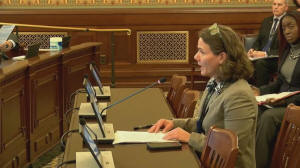|
The Department of Early Childhood was announced by Gov. J.B.
Pritzker in October. Tuesday in Springfield, a House committee
heard more details from Ann Whalen, the early childhood
transition director, about what the agency aims to do with an
initial additional taxpayer cost of $13.1 million
“It proposes to unify early childhood services under one new
agency, the Department of Early Childhood, in order to make it
easier for families to access services,” Whalen told
legislators.
The $13.1 million for the inaugural year would be split up for
staffing and operations support and funds to educate parents and
providers. Over the next two years, once the new agency
consolidates early childhood services from the Illinois State
Board of Education, Department of Human Services and Department
of Children and Family Services, it could have a $4 billion
budget when including federal taxpayer dollars, Whalen said.
In the proposed fiscal year 2025 budget, DHS has $466.7 million
outlined for early childhood programs. ISBE has $786.8 million
for early childhood. DCFS has $60.5 million for the day care
line item.
State Rep. Blaine Wilhour, R-Beecher City, was cautious there’d
be any savings.
“I don’t know if I’ve ever seen a new government agency reduce
redundancies, but I guess we’ll see,” Wilhour said.
The expected salary for the cabinet level leader for the
department found in House Bill 5451 will be more than $214,000 a
year.
If created by law, the agency would take two years to fully
consolidate early childhood services from other state agencies.
“And to work with parents, providers and other stakeholders to
redesign the system,” Whalen said. “Most importantly, to ensure
that there’s continuity of care and service and supports for
families during this time of transition.”
She said during that time, they plan to take regular feedback
from stakeholders.
State Rep. Sue Scherer, D-Decatur, raised concerns about how the
costs for a new agency could crowd out other available money for
things like K-12 education.
“But where’s the money going to come from and where are we going
to take it away from, and we have no idea,” Scherer said.
Legislators have until May 31 to pass an annual state spending
plan with simple majorities.

|
|




